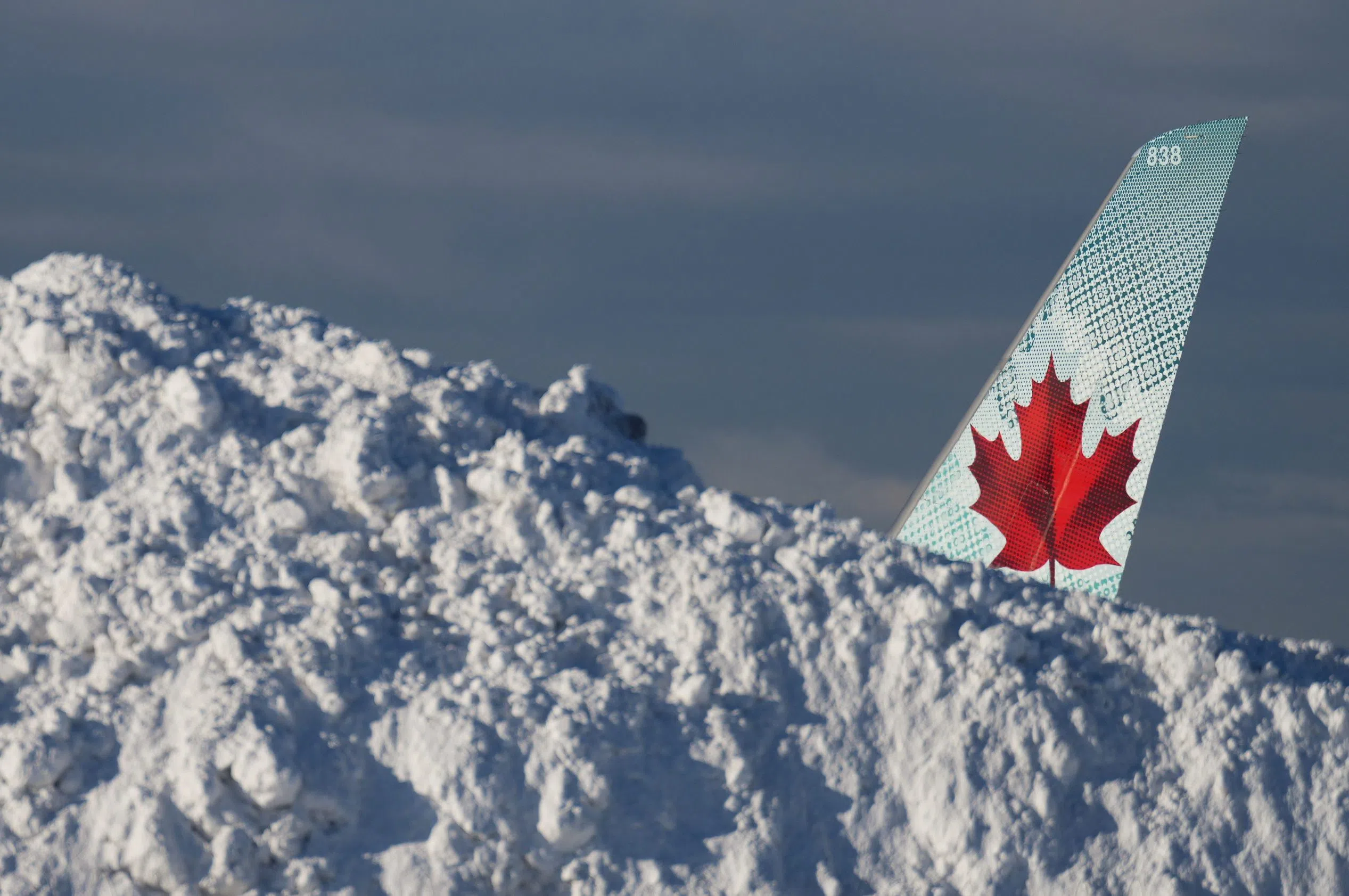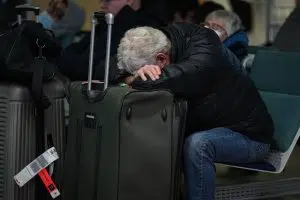While a large snowfall in Vancouver is contributing to people’s Christmas plans being tossed asunder, it’s not the only reason.
“This issue is they have a lot of snow. They got 27 centimetres of snow, which is more than they are normally going to get,” said John Gradek, an aviation expert and a lecturer in the aviation management program at McGill University.
“They lost a lot of experience as a result of the COVID-19 reductions in staff. The people who are there haven’t really been through a major snowstorm like this and they are learning. They are learning as they are going along and they are trying to make do with the knowledge they have today and it’s not sufficient. That’s why you have the operation backed up like it is.
“They’re late to get snowplows out. Airplanes are on gates when they shouldn’t be on gates. There’s a number of activities that took place that are compounding the snow effect.”
A man rests on his luggage at Vancouver International Airport after a snowstorm crippled operations leading to cancellations and major delays on Dec. 20, 2022. THE CANADIAN PRESS/Darryl Dyck
It’s an unlucky turn of events that the Vancouver snowstorm occurred during the Christmas rush — the busiest time of the year for airlines.
“We have 60,000 passengers disrupted in Vancouver and these 60,000 passengers have no place to go because the flights are full. You have a lot of very disappointed passengers and you’ve got mounds and mounds of baggage that has been misplaced from their owner,” Gradek said.
“It’s going to take a bit of time to work through this snag. I predict it will take about a week before it kind of settles down.”
Gradek says this past summer had similar issues due to staffing shortages in the industry.
“They’ve kind of got over the staff shortage piece; they’ve brought people on board but they need experience. They have to go through these trials and tribulations of weather in a Canadian environment and that’s where we find situations where they don’t have the knowledge and the work experience to be able to deal with these type of situations,” Gradek said.
It can all still be traced back to the COVID-19 pandemic and airlines essentially shutting down in 2020.
“Airlines and airports basically reduced their staff levels and the easiest way to reduce staff levels is to have early retirement,” Gradek said. “With the early retirement goes a lot of experience, so they have lost centuries worth of experience of the last two years — people who have gone through these snowstorms in the past and right now they are having a hard time trying to make it work.”
He said any sort of issue facing major airlines can have a ripple effect across the country because of how the aviation system works in the country.
“Air Canada and WestJet, the airplanes are all interconnected. They fly to Vancouver, fly to Hawaii, fly back to Vancouver and then to Halifax as an example. They are flying all over the place,” Gradek said.
“You might look out the window and it’s nice and sunny where you are, but they are saying your flight has been cancelled or delayed because of weather … It’s not the local weather that is causing the issues, it’s weather across the system that is causing the issue.”
While this issue is causing headaches for travellers now, Gradek said this is a blip on the radar for the industry.
“They will have to go through two or three of these weather events before they get the hang of it. Airlines and airport operations are a function of business practices but also experience. It’s going to take them a bit of time. I figure by July or August, we will be back in pretty good shape,” Gradek said.
If a person is travelling, he recommends to check both local and destination weather and to pack lightly. If a person needs to check luggage, he suggests having a tracking device to know the baggage’s location.
“Have a lot of patience when you get to the airport. Things do go bump in the night and it might be nice and sunny and relatively warm where you are but another part of the country or the world may be going through what Vancouver has gone through the last couple of days and your operation gets disrupted,” Gradek said.
“You’ve got to have lots of patience and hang in there. Don’t take your frustrations out on the airline employees. They are doing the best they can but we are talking about a system, an aviation system, that has to work and everyone needs to make sure that everything is operating according to the plan.”












